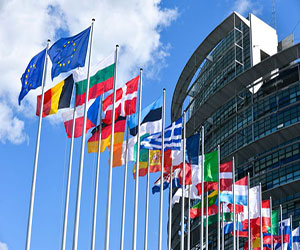The Windsor Framework recently received UK Parliamentary approval by a significant voting margin of 515 to 29 votes, a distance seldom seen in the UK in the history of Brexit related votes, including the 2016 referendum. In fact, it is a voting margin the width of which is a rarity in the history of votes on the subject of the UK’s relationship with the EU. Not even in 1975, when the UK voted in a referendum to maintain its membership of the EU, was a margin of more than two thirds exceeded. What could explain such a strong and an apparently uncharacteristically consensual approach of UK Parliamentary MPs on the divisive question of Europe? It is safe to say that when it comes to the delicate, historically and politically sensitive complex question of Northern Ireland, a voting margin as conclusive as this is not actually that surprising in this context. MPs in Westminster want to be, and be seen, to be supportive of attempts to provide a solution to the tensions. The Windsor Framework, the details of which are aptly discussed elsewhere in this blog has provided an avenue for the practical way in which the Northern Ireland Protocol is implemented to be adjusted, in order to ease the tensions surrounding how EU rules are applied in Northern Ireland as compared with the rest of the UK. So, does the Windsor Framework indicate the future potential direction of integration between the EU and the UK, or is it just demonstrable of the return to British pragmatism?
As a Member of the Union, the UK had a reputation for being the State which was vocal in questioning the extent and direction of EU integration. On many occasions, it sought to utilise the mechanisms which were available to it for differentiated integration. For example, it (in)famously obtained a Protocol opt-out on social policy and was notable in its refusal to join the EMU. I have written that the prominent role of the UK in availing itself of the opportunities to utilise the differentiated integration mechanisms, has led differentiated integration to be attributed to the UK as a form of British exceptionalism. It was not considered demonstrable of British pragmatism. Arguably this continued with the Article 50 TEU withdrawal process, within which the Northern Ireland Protocol was constructed.
Whilst the withdrawal process was multifaceted, detailed and complex, as the extent of the Trade and Cooperation Agreement indicates, it suffices for present purposes to recall the extent that the concepts of “flexibility” and “sovereignty” were both referenced. In relation to flexibility, the UK was notable in seeking to utilise this concept to try to achieve a form of bespoke agreement. Brexit was/is not just an opt-out but the ultimate opt-out, a form of flexibility sought from outside membership of the European Union. In relation to the concept of sovereignty, it was arguably the desire f or sovereignty preservation that promoted the referendum and its outcome. Perhaps the Article 50 TEU process is just an exercise in sovereignty restatement, or perhaps it is a form of managed differentiation, the ultimate opt-out mechanism?
If we can view the Windsor Framework through this historic lens of the UK’s relationship with the EU, we can assess whether it is demonstrable of a continuation of the story of integration, or of the story of differentiated integration, between the EU and the UK. The advent of the Windsor Framework has certainly made some adjustments to the rhetoric on both sides, with more measured and constructive language, and a narrative now being used which emphasises closer cooperation and effective future collaboration. As the concept of sovereignty is developing, as has been discussed on this blog here and here, into a true modern sovereignty, which “today lies in the ability to independently manage infrastructures and data circulation”, the test may be to assess whether it is integration or differentiated integration which dominates the future relationship in spheres of potential future collaboration, such as in areas including research, energy and defence and security, or not at all. It should be recalled that the UK had a good record in compliance with its EU obligations when it was a Member State, especially in relation to the internal market. Arguably the UK’s pursuit of differentiated integration was a seemingly preferable option to non-compliance, suggesting that the UK wanted to opt-out of the areas of EU law it felt it could not comply with, instead of failing to abide by its legal obligations. If this was indeed the case, then we could expect integration and compliance in the areas chosen for closer cooperation with the potential for a contrasting divergence in other areas.
If the UK and the EU do use their recent display of the ability to formulate a compromise agreement on the Northern Ireland Protocol, in the form of the Windsor Framework, as a catalyst for a future relationship on a different footing than which has been punctuated by the UK’s withdrawal, we could see either a change in direction from differentiated integration to integration, but in selected areas, or differentiated integration set on a modern sovereignty footing. The story continues …
Per rimanere aggiornato sulle novità di EUblog iscriviti alla Newsletter!






















